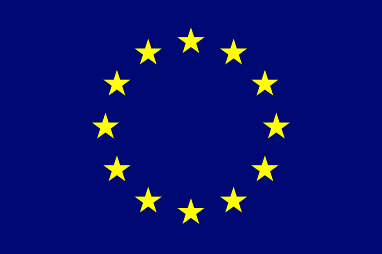Publications
Throughout the year, VOICE produces and disseminates key documents reflecting on humanitarian aid issues at the EU level and from an NGO perspective. They are addressed to decision-makers within the European institutions, at the National level, to NGO networks and other stakeholders of the humanitarian community, as well as to the VOICE members. Some documents are produced by the VOICE Secretariat with the support of VOICE members while others are publications from members and other key stakeholders in the humanitarian sector.
Please note that members-only documents will not be visible unless you are logged in.
-
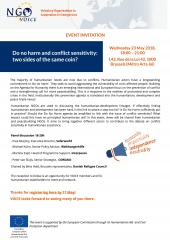
VOICE Event: Do no harm and conflict sensitivity: two sides of the same coin?
08 May 2018Please find here the invitation to the event and the link to register. -
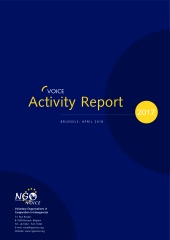
VOICE Activity report 2017
07 May 2018VOICE Activity ReportsVOICE Activity Report 2017 -
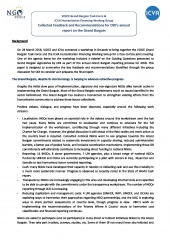
NGO Collected Feedback and Recommendations for ODI’s annual report on the Grand Bargain
07 May 2018VOICE position papersThis paper is designed to summarize the key feedback and recommendations identified through the group discussion between VOICE Grand Bargain Task Force & ICVA Humanitarian Financing Working Group, for ODI to consider as it prepares the final report. -
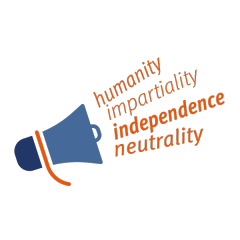
Humanitarian NGOs call for immediate cessation of hostilities, protection of civilians and humanitarian access in Kachin and northern Shan, Myanmar
02 May 2018 -
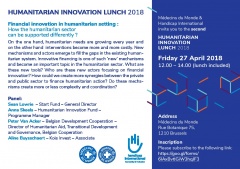
2nd Humanitarian innovation lunch on Financial innovation
03 April 2018Download the full agenda of the event. -

CARE report: Women and girls in emergencies
03 April 2018Members' publicationsA new report from CARE Danmark shows that women and girls in emergencies are extremely vulnerable. However, not enough funds are set aside to both prevent the problem and provide necessary support for the afflicted women. -

VOICE President letter to Commissioners - Post 2020 MFF - March 2018
19 March 2018Ahead of the European Commission's proposal for the next Multiannual Financial Framework, the President of VOICE addresses the network's recommendations with regards to humanitarian aid financing. -
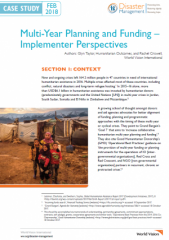
Multi-Year Planning and Funding: Implementer Perspectives
09 March 2018Members' publicationsThis study from World Vision International briefly examines World Vision's implementation of Multi-Year Planning and Funding (MYPF). Through interviews and document reviews of World Vision programmes in Jordan, Mozambique, Somalia, South Sudan and Zimbabwe, it seeks to understand the benefits of MYPF, as pledged by GHD donors. -
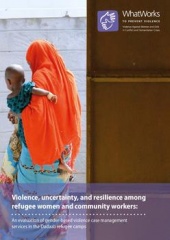
Violence, uncertainty, and resilience among refugee women and community workers: An evaluation of gender-based violence case management services in the Dadaab refugee camps
28 February 2018Members' publications -
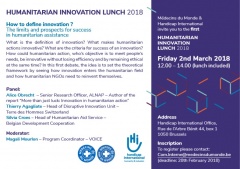
Humanitarian innovation lunch agenda
23 February 2018How to define innovation? The limits and prospects for success in humanitarian assistance. Here the agenda of the event. -
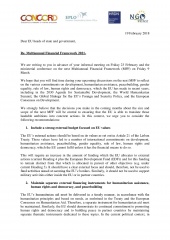
Joint letter of VOICE, CONCORD, EPLO and HRDN on the MFF 2021
22 February 2018VOICE position papersVOICE, CONCORD, EPLO and HRDN joint reccomandations on the Multiannual Financial Framework 2021 asking for strong external budget, separate instruments for humanitarian aid, humanRights, democracy and peacebuilding, more support to civilsociety and involvement of CSOs in MFF discussions -
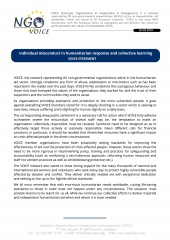
VOICE statement on Individual misconduct in humanitarian response and collective learning
19 February 2018VOICE statement following the recent facts of individual misconduct in Humanitarian organisations -
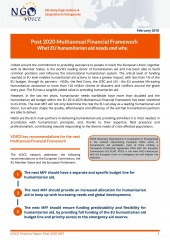
Post 2020 Multiannual Financial Framework (MFF). What EU humanitarian aid needs and why.
14 February 2018VOICE position papersVOICE position paper on the post 2020 Multi Annual Financial Framework -
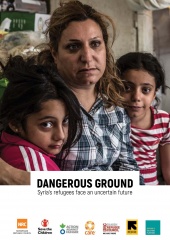
DANGEROUS GROUND,Syria’s refugees face an uncertain future
05 February 2018Members' publicationsAs the military situation changed in Syria, and against a backdrop of increased anti-refugee rhetoric and policies across the world, governments began in 2017 to openly contemplate the return of refugees to the country.
In this report, the Norwegian Refugee Council, Save the Children, Action Against Hunger, CARE International, the International Rescue Committee and the Danish Refugee Council warn that the situation in Syria is far from safe, however, and that the prevailing interest in securing the return of refugees is undermining their safety and dignity in neighbouring countries, creating push factors and increasing the likelihood of forced returns in 2018. It also threatens to limit the options for making a life beyond the region through resettlement or other safe and legal routes.
-
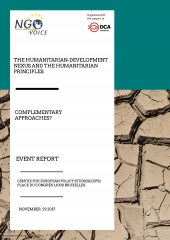
The humanitarian-development nexus and the humanitarian principles: complementary approaches?
31 January 2018VOICE event reportsOur report of the event on the humanitarian-development nexus and the humanitarian principles. -
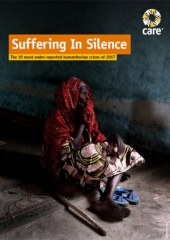
CARE Report: Suffering in Silence – Ten Most Underreported Humanitarian Crises in 2017
25 January 2018Members' publicationsNatural disasters and conflicts make headlines – yet with the highest number of refugees since World War II and with an uptake and intensification of natural disasters in the past years, many major crises do not receive adequate media attention. Media reporting is key to raise public attention, which is important in many ways: it helps raise funds, it applies pressure on governments to change political action and develop policies, and it amplifies the voices of the many millions who have been affected by deadly disasters and brutal conflict.
For the second time, CARE issued this report to shed light on forgotten crises which have received little to no attention last year. The report was launched in Geneva earlier this week by CARE Interim Secretary-General Laurie Lee, UN High Commissioner for Refugees Filippo Grandi and IRIN Director Heba Aly.
-
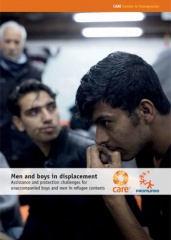
Care Report Men and boys in displacement: Assistance and protection challenges for unaccompanied boys and men in refugee contexts
25 January 2018Members' publicationsRefugee women and children face specific risks and their needs are, quite rightly, highlighted and addressed by the humanitarian community. However, the situation and specific needs of single male refugees is often less understood. This report aims to address this information gap.
With a focus on the situation in Lebanon, Turkey, Jordan, and Greece, the report aims to provide a better understanding of the gendered impact of the refugee crisis on unaccompanied adolescent boys, aged 13 to 17, and men, single or living separately from their families; and to highlight actual and potential gaps in the humanitarian response. The report is based on a literature review, key informant interviews, and direct observation during a two-week mission in Greece. It presents recommendations for international and national humanitarian agencies, for donors, and for refugee-hosting governments. -
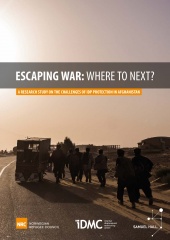
NRC Report: Escaping war, where to next?
25 January 2018Members' publicationsA RESEARCH STUDY ON THE CHALLENGES OF IDP PROTECTION IN AFGHANISTAN -
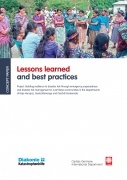
Lessons Learned and Best Practices in Guatemala: Disaster Risk Reduction activities in Central America
25 January 2018Members' publicationsDisaster risk reduction (DRR) is understood as “the application of disaster risk reduction policies and strategies to prevent new disaster risk, reduce existing disaster risk and manage residual risk, contributing to the strengthening of resilience and reduction of disaster losses” (UNISDR).
A new publication is the result of the joint cooperation of the Protestant organization Diakonie Katastrophenhilfe, its Catholic counterpart Caritas Germany and the Federal Ministry of Foreign Affairs of Germany. It is based on the experiences gained from 2015 to 2017 in the project “Building resilience to disaster risk through emergency preparedness and disaster risk management in rural Maya communities in the Departments of Baja Verapaz, Quetzaltenango and Quiché, Guatemala”.
The document compiles relevant information for DRR-projects in Central America in form of lessons learned and best practices, with the aim of benefiting projects to be designed in the coming years.
-
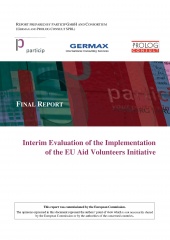
Final Report of the EU Aid Volunteers interim evaluation
22 January 2018This is the final report of the EUAV interim evaluation that took place in 2017. -
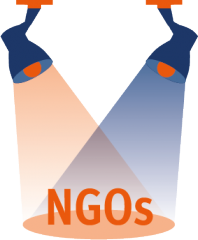
Partners' Conference 2017 - Speech of VOICE President - Nicolas Borsinger
19 December 2017Speech delivered by Nicolas Borsinger, President of VOICE, on the 1st of December 2017 at the occasion of the Annual Partners' Conference organised by ECHO.
Check against delivery. -
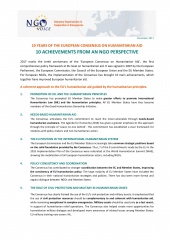
10 years of the European Consensus on Humanitarian Aid: 10 Achievements From An NGO Perspective
18 December 2017VOICE position papersTo celebrate this important statement for Humanitarian aid, we have highlighted the 10 main achievements of the Consensus implementation from an NGO perspective. -
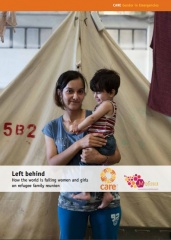
CARE Report: Left behind: How the world is failing women and girls on refugee family reunion
13 December 2017Members' publicationsThis report, based on new research from Greece and elsewhere, highlights how the failure to provide safe and legal routes for refugees, in particular for family reunion, has gendered impacts on women and girls left stranded in countries of transit. -
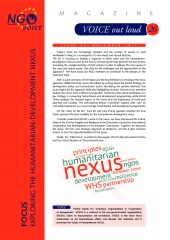
VOICE out loud 26 Exploring the humanitarian-development nexus
04 December 2017VOICE out loudIn this edition of the VOICE Out Loud we have asked our members to explore the opportunities and challenges of the humanitarian-development nexus. -
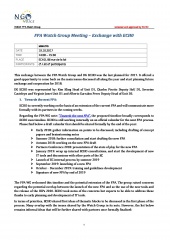
FPA WG meeting exchange with ECHO - 19 October 2017
16 November 2017FPA Watch Group

